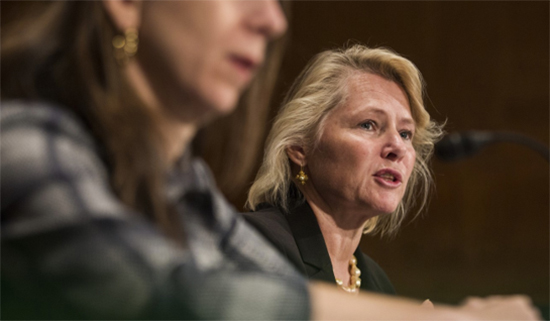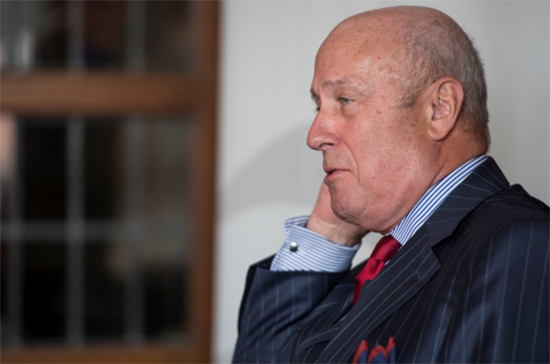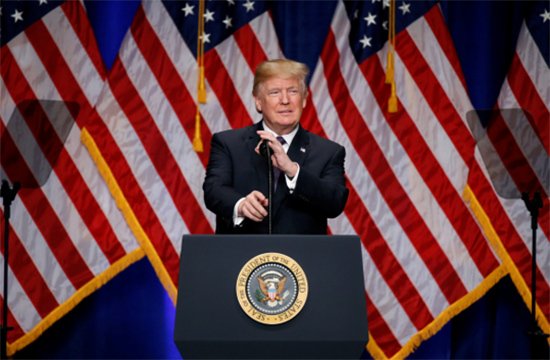


Susan Thornton (right). File photo: Bloomberg
Washington (People's Daily) - US President Donald Trump recently nominated Susan Thornton as assistant secretary for East Asian and Pacific Affairs at the US State Department, a move closely watched by DC foreign policy analysts.
Steve Bannon, former White House chief strategist, blocked her previous nomination. But Washington think-tanks believed that putting Thornton in a higher diplomatic role would give the US a better grip on Asia foreign policy.
“Susan Thornton is one of America’s finest diplomats. She has deep expertise, a healthy combination of grit and creativity, and a proven record of getting things done,” said Ryan Hass, research fellow in the Foreign Policy program at the Brookings Institution, during an interview on Thornton’s nomination. Before Brookings, Hass served on the National Security Council and at the US State Department.

Ryan Hass. File photo: Brookings
According to Thornton’s official CV on the State Department website, she first joined the State Department in 1991 and had spent the last 20 years working on US policy in Eurasia, with a focus on the former Soviet Union and East Asia.
Thornton’s previous Foreign Service posts include Deputy Head of Mission in Turkmenistan, Deputy Director of the Office of Chinese and Mongolian Affairs at the State Department in Washington, Economic Unit Chief in the Office of Korean Affairs, along with other overseas posts in Beijing, Chengdu, Yerevan, and Almaty.
Douglas Paal, vice president for studies at the Carnegie Endowment for International Peace, said Thornton reflects mainstream American interests in relations with China, including areas cooperation and growing competition.
As for Bannon’s attack on Thornton, Paal believed it was unfounded.
“I don’t know beyond what Bannon himself was quoted as saying, that she is some sort of ‘panda hugger,’ or pro-Beijing figure. As far as I can tell, she is thoroughly pro-American and yet knowledgeable about China, about what works and what does not. I had a very senior Asian diplomat ask me this week, ‘Why do they call her a panda hugger? She is anything but.’”

Douglas Paal. File photo: Paulson Institute
Thornton’s nomination arrived as the State Department was reshuffling and resignations came pouring in, hindering progress.
Last month media reported the US Secretary of State Rex Tillerson was on his way out at Foggy Bottom and CIA director Mike Pompeo was poised to take his place. But from the outset of the Trump administration, Thornton has been seen as a Tillerson ally.
In mid-August, Bannon shelled Thornton, publicly stating he wanted to drive her out of the State Department. But the next day a photo of Tillerson shaking hands with Thornton in public was interpreted as a personal endorsement.
Ever since the Trump administration moved in to the Oval Office, vacancies have grown at the State Department and are a source of concern among US foreign policy analysts. Thornton’s seat as Assistant Secretary of State for East Asian and Pacific Affairs has been vacant ever since Daniel Russel exited, who served during the Obama administration.
“Some seats should remain empty, having been created for purposes whose times have passed, but many others need filling to do the business of the American people. There is more damage coming from some appointees at the top of the American administration than from the lower levels where appointees are needed,” said Paal.
One of the key tasks ahead for Thornton is to manage Sino-US relations, widely viewed as the most important bilateral relationship on the international stage.
In the first report from the National Security Strategy (NSS) last week, the Trump administration labeled China as a strategic competitor. The report repeatedly drew attention to China and Russia as two countries that "challenge American power, influence and interests, attempting to erode American security and prosperity."
"China is seen as a strategic competitor because China competes effectively across the political, economic, military and informational domains in ways probably not duplicated by our other competitors," a senior administration official said a day before the report was released.

US President Donald Trump speaks his administration's National Security Strategy meeting at the Ronald Reagan Building and International Trade Center in Washington D.C., on December 18, 2017. Photo: Mark Wilson / Getty Images
In a statement addressing the NSS, a spokesperson from the Chinese Embassy in Washington DC said, “On one hand, the US government claims that it is attempting to build a great partnership with China. On the other hand, it labels China as a rival. The self-contradictory rhetoric of the US betrays the truth that China and the US are becoming increasingly interdependent and have growing intertwined interests. The US rhetoric also runs counter to China's efforts to cooperate with the US on bilateral and global issues.”
American experts spoke with People’s Daily following the release of the NSS report, expressing concerns over the harsh language from the Trump administration as it could create tension between the US and China, detrimental to both countries' interests.
Former US Ambassador to China and Assistant Secretary of State J. Stapleton Roy in an earlier interview downplayed the impact of the NSS report.
“The only way to address the economic challenges between the US and China is through dialogue and negotiations… Other countries should not overreact to this position of the Trump administration because the approach outlined in this national security strategy is not workable," said Roy.
“NSS’s tend to fade away quickly, and this will be no different. The tough language, however, does reflect a real shift in expert and public opinion in the United States about the quality and benefits of the US relationship with China. Beijing should pay attention to that,” said Paal.
 Fire brigade in Shanghai holds group wedding
Fire brigade in Shanghai holds group wedding Tourists enjoy ice sculptures in Datan Town, north China
Tourists enjoy ice sculptures in Datan Town, north China Sunset scenery of Dayan Pagoda in Xi'an
Sunset scenery of Dayan Pagoda in Xi'an Tourists have fun at scenic spot in Nanlong Town, NW China
Tourists have fun at scenic spot in Nanlong Town, NW China Harbin attracts tourists by making best use of ice in winter
Harbin attracts tourists by making best use of ice in winter In pics: FIS Alpine Ski Women's World Cup Slalom
In pics: FIS Alpine Ski Women's World Cup Slalom Black-necked cranes rest at reservoir in Lhunzhub County, Lhasa
Black-necked cranes rest at reservoir in Lhunzhub County, Lhasa China's FAST telescope will be available to foreign scientists in April
China's FAST telescope will be available to foreign scientists in April "She power" plays indispensable role in poverty alleviation
"She power" plays indispensable role in poverty alleviation Top 10 world news events of People's Daily in 2020
Top 10 world news events of People's Daily in 2020 Top 10 China news events of People's Daily in 2020
Top 10 China news events of People's Daily in 2020 Top 10 media buzzwords of 2020
Top 10 media buzzwords of 2020 Year-ender:10 major tourism stories of 2020
Year-ender:10 major tourism stories of 2020 No interference in Venezuelan issues
No interference in Venezuelan issues
 Biz prepares for trade spat
Biz prepares for trade spat
 Broadcasting Continent
Broadcasting Continent Australia wins Chinese CEOs as US loses
Australia wins Chinese CEOs as US loses